MBA402: Governance, Ethics: Timberwell Construction Report
VerifiedAdded on 2023/06/15
|11
|2168
|288
Report
AI Summary
This report assesses the sustainability of Timberwell Construction based on the GRI (Global Reporting Initiative) 2016 standards, evaluating the company's impact on society, the environment, and the economy. The assessment covers economic sustainability, examining financial implications related to climate change, corruption incidents, and anti-competitive behavior. It also addresses environmental sustainability, focusing on energy consumption, biodiversity impact, and compliance with environmental regulations. Furthermore, the report evaluates social sustainability by analyzing employee turnover, discrimination incidents, and community engagement. The analysis reveals that Timberwell Construction has faced challenges, including corruption practices, anti-competitive behavior, and high employee turnover, primarily due to non-compliance with sustainability reporting standards. The report concludes by emphasizing the need for Timberwell to strictly adhere to sustainability requirements and standards to improve its overall performance and reputation.
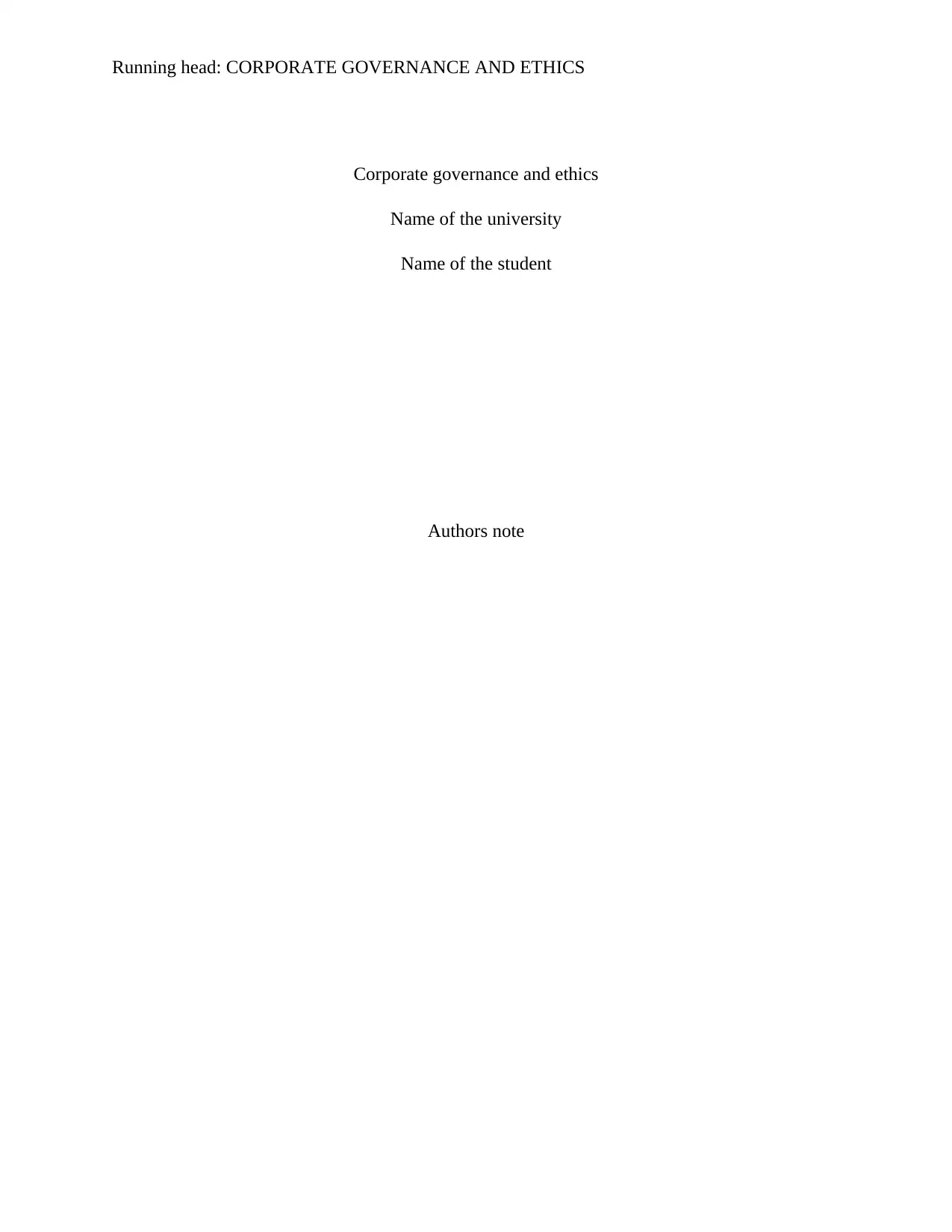
Running head: CORPORATE GOVERNANCE AND ETHICS
Corporate governance and ethics
Name of the university
Name of the student
Authors note
Corporate governance and ethics
Name of the university
Name of the student
Authors note
Paraphrase This Document
Need a fresh take? Get an instant paraphrase of this document with our AI Paraphraser
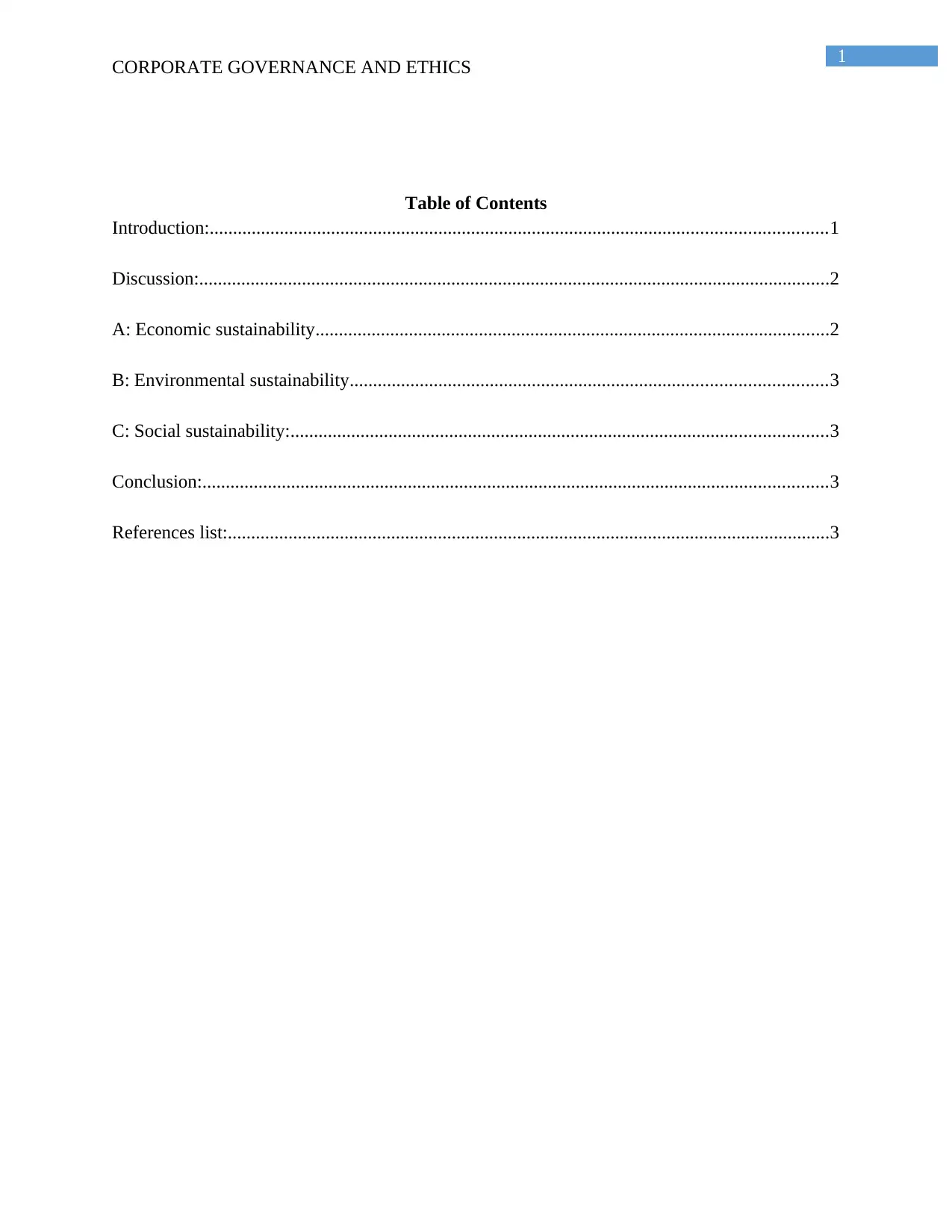
1
CORPORATE GOVERNANCE AND ETHICS
Table of Contents
Introduction:....................................................................................................................................1
Discussion:.......................................................................................................................................2
A: Economic sustainability..............................................................................................................2
B: Environmental sustainability......................................................................................................3
C: Social sustainability:...................................................................................................................3
Conclusion:......................................................................................................................................3
References list:.................................................................................................................................3
CORPORATE GOVERNANCE AND ETHICS
Table of Contents
Introduction:....................................................................................................................................1
Discussion:.......................................................................................................................................2
A: Economic sustainability..............................................................................................................2
B: Environmental sustainability......................................................................................................3
C: Social sustainability:...................................................................................................................3
Conclusion:......................................................................................................................................3
References list:.................................................................................................................................3
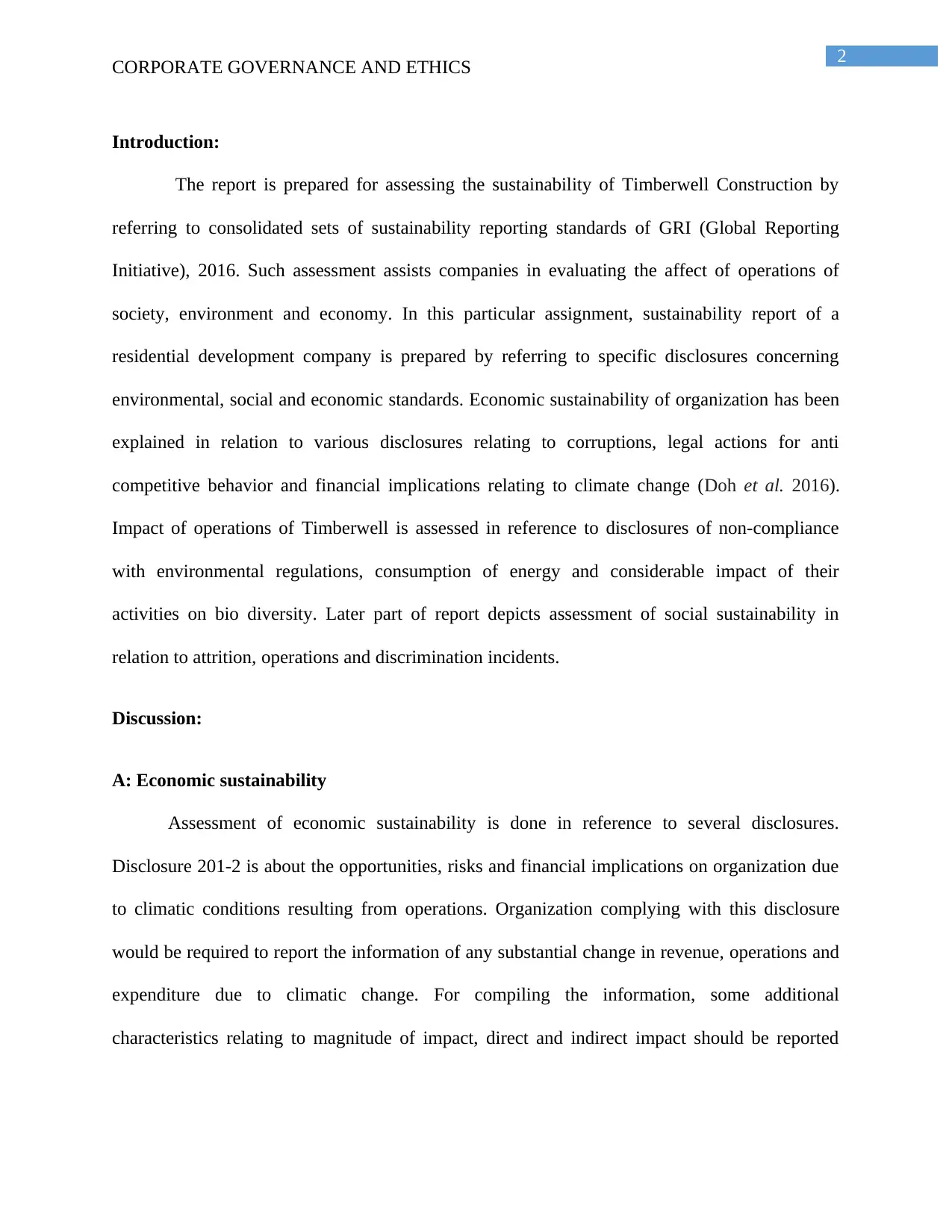
2
CORPORATE GOVERNANCE AND ETHICS
Introduction:
The report is prepared for assessing the sustainability of Timberwell Construction by
referring to consolidated sets of sustainability reporting standards of GRI (Global Reporting
Initiative), 2016. Such assessment assists companies in evaluating the affect of operations of
society, environment and economy. In this particular assignment, sustainability report of a
residential development company is prepared by referring to specific disclosures concerning
environmental, social and economic standards. Economic sustainability of organization has been
explained in relation to various disclosures relating to corruptions, legal actions for anti
competitive behavior and financial implications relating to climate change (Doh et al. 2016).
Impact of operations of Timberwell is assessed in reference to disclosures of non-compliance
with environmental regulations, consumption of energy and considerable impact of their
activities on bio diversity. Later part of report depicts assessment of social sustainability in
relation to attrition, operations and discrimination incidents.
Discussion:
A: Economic sustainability
Assessment of economic sustainability is done in reference to several disclosures.
Disclosure 201-2 is about the opportunities, risks and financial implications on organization due
to climatic conditions resulting from operations. Organization complying with this disclosure
would be required to report the information of any substantial change in revenue, operations and
expenditure due to climatic change. For compiling the information, some additional
characteristics relating to magnitude of impact, direct and indirect impact should be reported
CORPORATE GOVERNANCE AND ETHICS
Introduction:
The report is prepared for assessing the sustainability of Timberwell Construction by
referring to consolidated sets of sustainability reporting standards of GRI (Global Reporting
Initiative), 2016. Such assessment assists companies in evaluating the affect of operations of
society, environment and economy. In this particular assignment, sustainability report of a
residential development company is prepared by referring to specific disclosures concerning
environmental, social and economic standards. Economic sustainability of organization has been
explained in relation to various disclosures relating to corruptions, legal actions for anti
competitive behavior and financial implications relating to climate change (Doh et al. 2016).
Impact of operations of Timberwell is assessed in reference to disclosures of non-compliance
with environmental regulations, consumption of energy and considerable impact of their
activities on bio diversity. Later part of report depicts assessment of social sustainability in
relation to attrition, operations and discrimination incidents.
Discussion:
A: Economic sustainability
Assessment of economic sustainability is done in reference to several disclosures.
Disclosure 201-2 is about the opportunities, risks and financial implications on organization due
to climatic conditions resulting from operations. Organization complying with this disclosure
would be required to report the information of any substantial change in revenue, operations and
expenditure due to climatic change. For compiling the information, some additional
characteristics relating to magnitude of impact, direct and indirect impact should be reported
⊘ This is a preview!⊘
Do you want full access?
Subscribe today to unlock all pages.

Trusted by 1+ million students worldwide
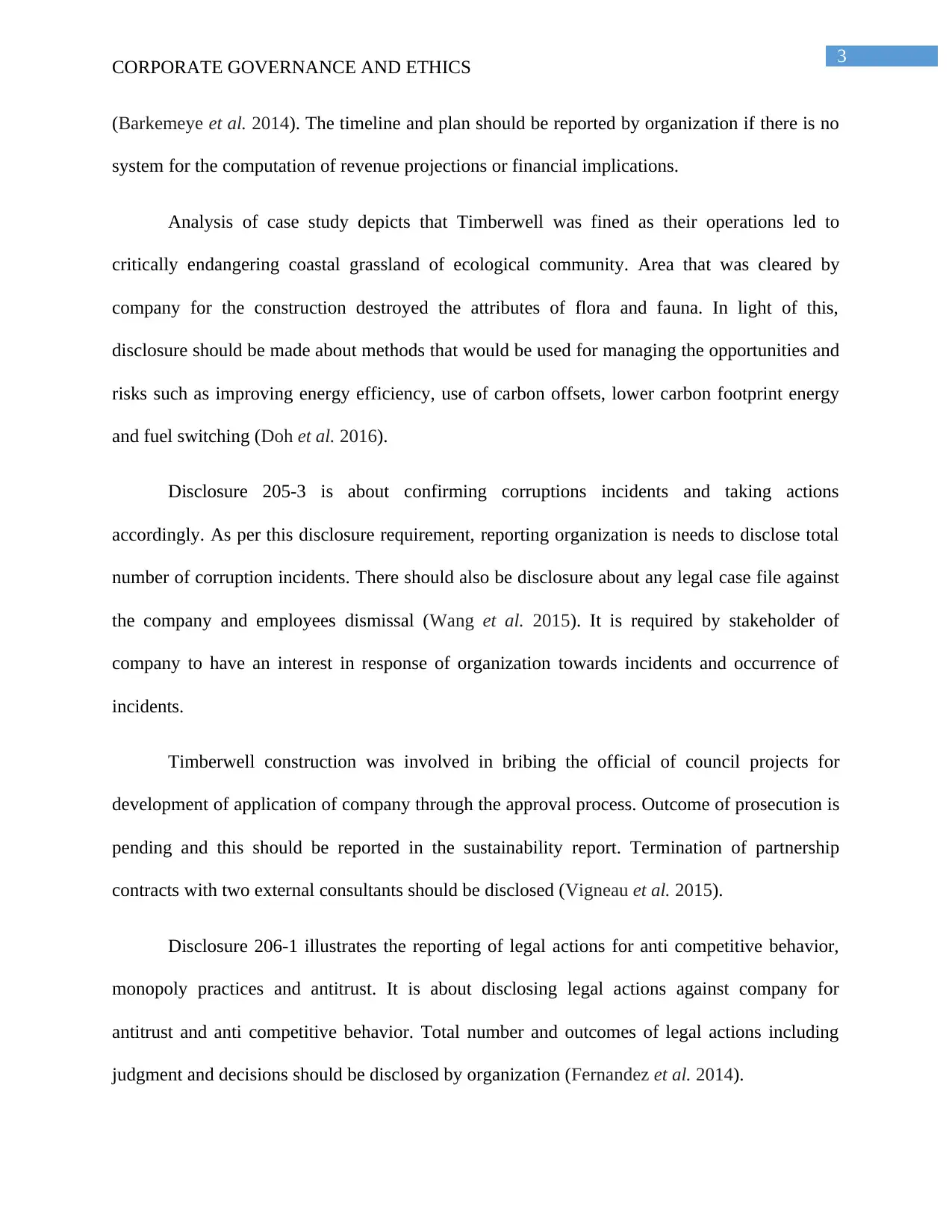
3
CORPORATE GOVERNANCE AND ETHICS
(Barkemeye et al. 2014). The timeline and plan should be reported by organization if there is no
system for the computation of revenue projections or financial implications.
Analysis of case study depicts that Timberwell was fined as their operations led to
critically endangering coastal grassland of ecological community. Area that was cleared by
company for the construction destroyed the attributes of flora and fauna. In light of this,
disclosure should be made about methods that would be used for managing the opportunities and
risks such as improving energy efficiency, use of carbon offsets, lower carbon footprint energy
and fuel switching (Doh et al. 2016).
Disclosure 205-3 is about confirming corruptions incidents and taking actions
accordingly. As per this disclosure requirement, reporting organization is needs to disclose total
number of corruption incidents. There should also be disclosure about any legal case file against
the company and employees dismissal (Wang et al. 2015). It is required by stakeholder of
company to have an interest in response of organization towards incidents and occurrence of
incidents.
Timberwell construction was involved in bribing the official of council projects for
development of application of company through the approval process. Outcome of prosecution is
pending and this should be reported in the sustainability report. Termination of partnership
contracts with two external consultants should be disclosed (Vigneau et al. 2015).
Disclosure 206-1 illustrates the reporting of legal actions for anti competitive behavior,
monopoly practices and antitrust. It is about disclosing legal actions against company for
antitrust and anti competitive behavior. Total number and outcomes of legal actions including
judgment and decisions should be disclosed by organization (Fernandez et al. 2014).
CORPORATE GOVERNANCE AND ETHICS
(Barkemeye et al. 2014). The timeline and plan should be reported by organization if there is no
system for the computation of revenue projections or financial implications.
Analysis of case study depicts that Timberwell was fined as their operations led to
critically endangering coastal grassland of ecological community. Area that was cleared by
company for the construction destroyed the attributes of flora and fauna. In light of this,
disclosure should be made about methods that would be used for managing the opportunities and
risks such as improving energy efficiency, use of carbon offsets, lower carbon footprint energy
and fuel switching (Doh et al. 2016).
Disclosure 205-3 is about confirming corruptions incidents and taking actions
accordingly. As per this disclosure requirement, reporting organization is needs to disclose total
number of corruption incidents. There should also be disclosure about any legal case file against
the company and employees dismissal (Wang et al. 2015). It is required by stakeholder of
company to have an interest in response of organization towards incidents and occurrence of
incidents.
Timberwell construction was involved in bribing the official of council projects for
development of application of company through the approval process. Outcome of prosecution is
pending and this should be reported in the sustainability report. Termination of partnership
contracts with two external consultants should be disclosed (Vigneau et al. 2015).
Disclosure 206-1 illustrates the reporting of legal actions for anti competitive behavior,
monopoly practices and antitrust. It is about disclosing legal actions against company for
antitrust and anti competitive behavior. Total number and outcomes of legal actions including
judgment and decisions should be disclosed by organization (Fernandez et al. 2014).
Paraphrase This Document
Need a fresh take? Get an instant paraphrase of this document with our AI Paraphraser
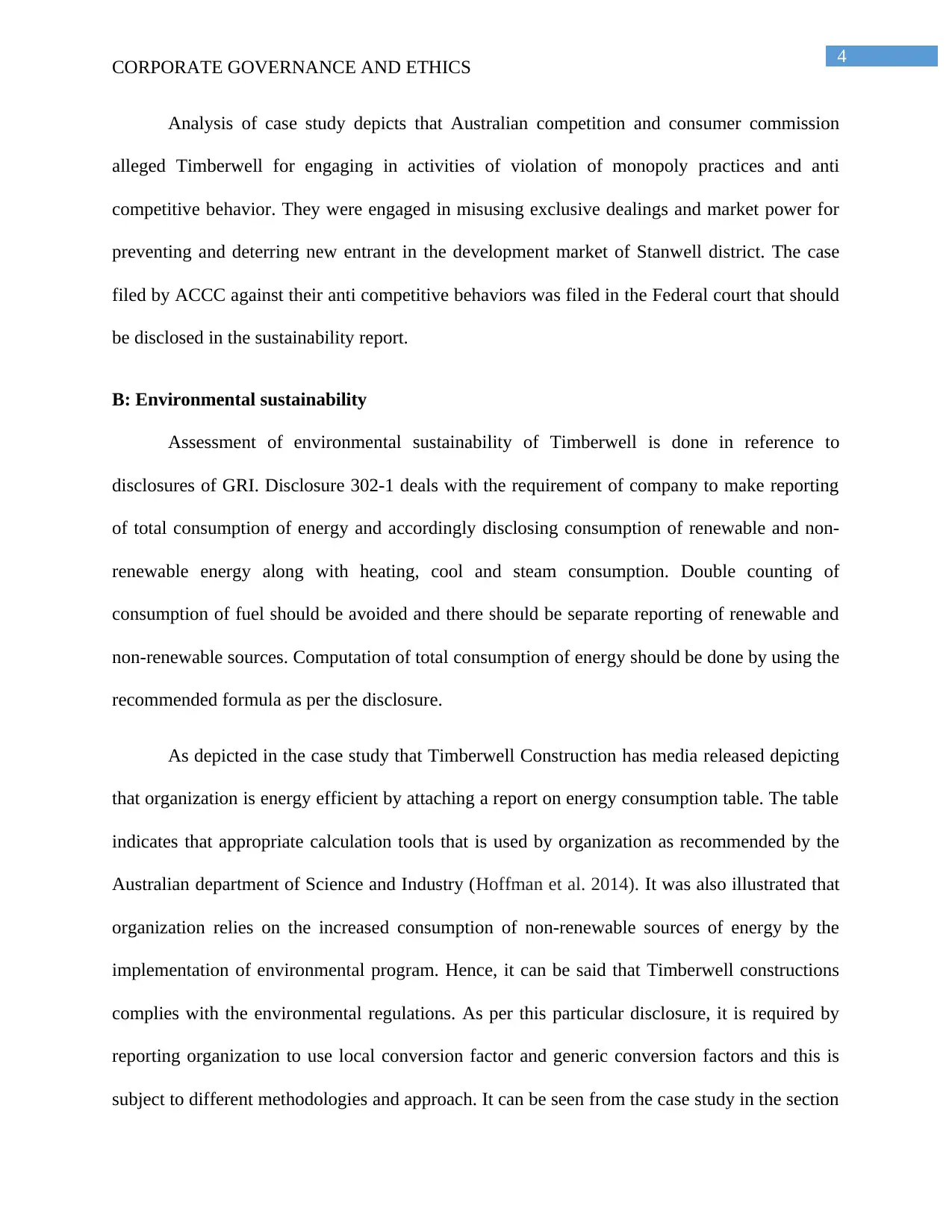
4
CORPORATE GOVERNANCE AND ETHICS
Analysis of case study depicts that Australian competition and consumer commission
alleged Timberwell for engaging in activities of violation of monopoly practices and anti
competitive behavior. They were engaged in misusing exclusive dealings and market power for
preventing and deterring new entrant in the development market of Stanwell district. The case
filed by ACCC against their anti competitive behaviors was filed in the Federal court that should
be disclosed in the sustainability report.
B: Environmental sustainability
Assessment of environmental sustainability of Timberwell is done in reference to
disclosures of GRI. Disclosure 302-1 deals with the requirement of company to make reporting
of total consumption of energy and accordingly disclosing consumption of renewable and non-
renewable energy along with heating, cool and steam consumption. Double counting of
consumption of fuel should be avoided and there should be separate reporting of renewable and
non-renewable sources. Computation of total consumption of energy should be done by using the
recommended formula as per the disclosure.
As depicted in the case study that Timberwell Construction has media released depicting
that organization is energy efficient by attaching a report on energy consumption table. The table
indicates that appropriate calculation tools that is used by organization as recommended by the
Australian department of Science and Industry (Hoffman et al. 2014). It was also illustrated that
organization relies on the increased consumption of non-renewable sources of energy by the
implementation of environmental program. Hence, it can be said that Timberwell constructions
complies with the environmental regulations. As per this particular disclosure, it is required by
reporting organization to use local conversion factor and generic conversion factors and this is
subject to different methodologies and approach. It can be seen from the case study in the section
CORPORATE GOVERNANCE AND ETHICS
Analysis of case study depicts that Australian competition and consumer commission
alleged Timberwell for engaging in activities of violation of monopoly practices and anti
competitive behavior. They were engaged in misusing exclusive dealings and market power for
preventing and deterring new entrant in the development market of Stanwell district. The case
filed by ACCC against their anti competitive behaviors was filed in the Federal court that should
be disclosed in the sustainability report.
B: Environmental sustainability
Assessment of environmental sustainability of Timberwell is done in reference to
disclosures of GRI. Disclosure 302-1 deals with the requirement of company to make reporting
of total consumption of energy and accordingly disclosing consumption of renewable and non-
renewable energy along with heating, cool and steam consumption. Double counting of
consumption of fuel should be avoided and there should be separate reporting of renewable and
non-renewable sources. Computation of total consumption of energy should be done by using the
recommended formula as per the disclosure.
As depicted in the case study that Timberwell Construction has media released depicting
that organization is energy efficient by attaching a report on energy consumption table. The table
indicates that appropriate calculation tools that is used by organization as recommended by the
Australian department of Science and Industry (Hoffman et al. 2014). It was also illustrated that
organization relies on the increased consumption of non-renewable sources of energy by the
implementation of environmental program. Hence, it can be said that Timberwell constructions
complies with the environmental regulations. As per this particular disclosure, it is required by
reporting organization to use local conversion factor and generic conversion factors and this is
subject to different methodologies and approach. It can be seen from the case study in the section
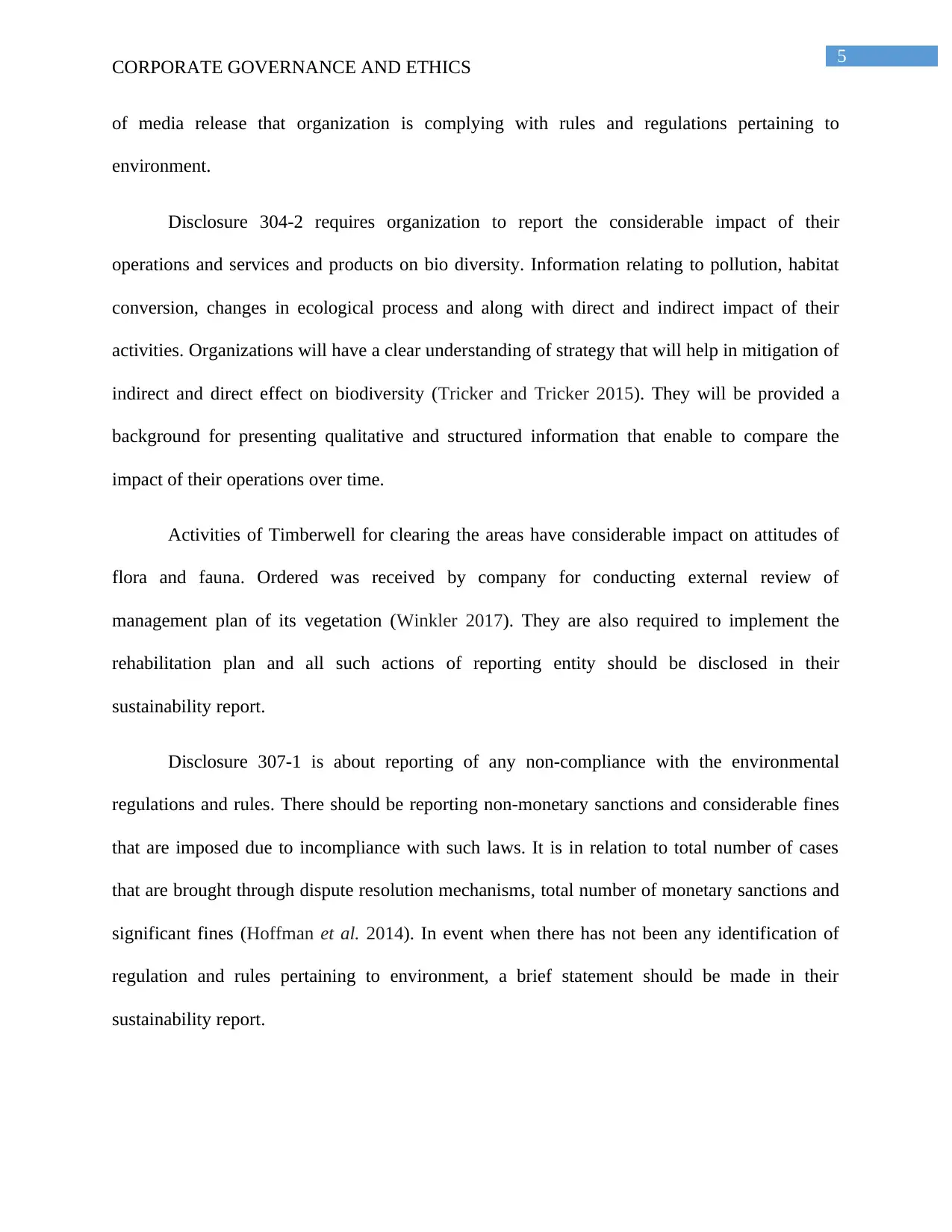
5
CORPORATE GOVERNANCE AND ETHICS
of media release that organization is complying with rules and regulations pertaining to
environment.
Disclosure 304-2 requires organization to report the considerable impact of their
operations and services and products on bio diversity. Information relating to pollution, habitat
conversion, changes in ecological process and along with direct and indirect impact of their
activities. Organizations will have a clear understanding of strategy that will help in mitigation of
indirect and direct effect on biodiversity (Tricker and Tricker 2015). They will be provided a
background for presenting qualitative and structured information that enable to compare the
impact of their operations over time.
Activities of Timberwell for clearing the areas have considerable impact on attitudes of
flora and fauna. Ordered was received by company for conducting external review of
management plan of its vegetation (Winkler 2017). They are also required to implement the
rehabilitation plan and all such actions of reporting entity should be disclosed in their
sustainability report.
Disclosure 307-1 is about reporting of any non-compliance with the environmental
regulations and rules. There should be reporting non-monetary sanctions and considerable fines
that are imposed due to incompliance with such laws. It is in relation to total number of cases
that are brought through dispute resolution mechanisms, total number of monetary sanctions and
significant fines (Hoffman et al. 2014). In event when there has not been any identification of
regulation and rules pertaining to environment, a brief statement should be made in their
sustainability report.
CORPORATE GOVERNANCE AND ETHICS
of media release that organization is complying with rules and regulations pertaining to
environment.
Disclosure 304-2 requires organization to report the considerable impact of their
operations and services and products on bio diversity. Information relating to pollution, habitat
conversion, changes in ecological process and along with direct and indirect impact of their
activities. Organizations will have a clear understanding of strategy that will help in mitigation of
indirect and direct effect on biodiversity (Tricker and Tricker 2015). They will be provided a
background for presenting qualitative and structured information that enable to compare the
impact of their operations over time.
Activities of Timberwell for clearing the areas have considerable impact on attitudes of
flora and fauna. Ordered was received by company for conducting external review of
management plan of its vegetation (Winkler 2017). They are also required to implement the
rehabilitation plan and all such actions of reporting entity should be disclosed in their
sustainability report.
Disclosure 307-1 is about reporting of any non-compliance with the environmental
regulations and rules. There should be reporting non-monetary sanctions and considerable fines
that are imposed due to incompliance with such laws. It is in relation to total number of cases
that are brought through dispute resolution mechanisms, total number of monetary sanctions and
significant fines (Hoffman et al. 2014). In event when there has not been any identification of
regulation and rules pertaining to environment, a brief statement should be made in their
sustainability report.
⊘ This is a preview!⊘
Do you want full access?
Subscribe today to unlock all pages.

Trusted by 1+ million students worldwide
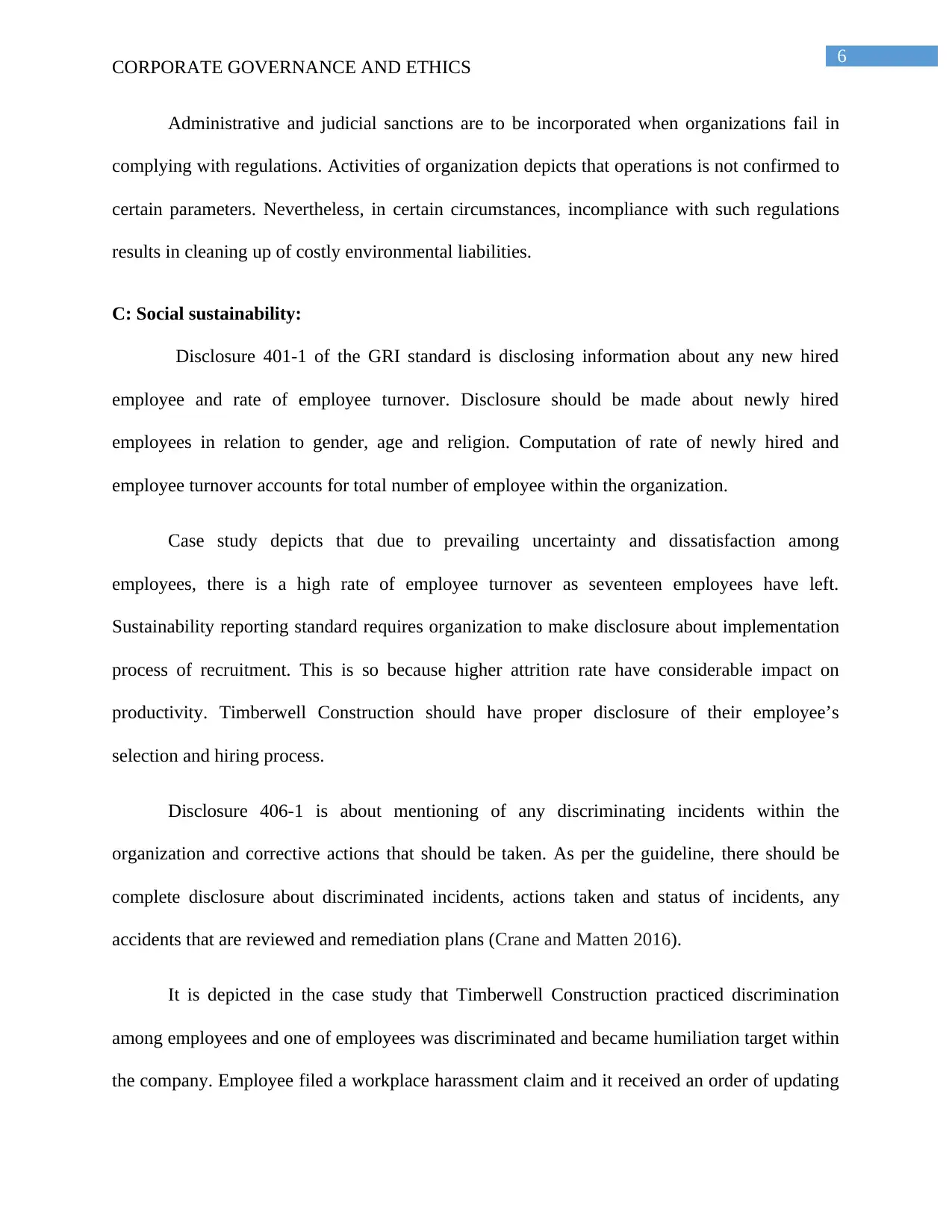
6
CORPORATE GOVERNANCE AND ETHICS
Administrative and judicial sanctions are to be incorporated when organizations fail in
complying with regulations. Activities of organization depicts that operations is not confirmed to
certain parameters. Nevertheless, in certain circumstances, incompliance with such regulations
results in cleaning up of costly environmental liabilities.
C: Social sustainability:
Disclosure 401-1 of the GRI standard is disclosing information about any new hired
employee and rate of employee turnover. Disclosure should be made about newly hired
employees in relation to gender, age and religion. Computation of rate of newly hired and
employee turnover accounts for total number of employee within the organization.
Case study depicts that due to prevailing uncertainty and dissatisfaction among
employees, there is a high rate of employee turnover as seventeen employees have left.
Sustainability reporting standard requires organization to make disclosure about implementation
process of recruitment. This is so because higher attrition rate have considerable impact on
productivity. Timberwell Construction should have proper disclosure of their employee’s
selection and hiring process.
Disclosure 406-1 is about mentioning of any discriminating incidents within the
organization and corrective actions that should be taken. As per the guideline, there should be
complete disclosure about discriminated incidents, actions taken and status of incidents, any
accidents that are reviewed and remediation plans (Crane and Matten 2016).
It is depicted in the case study that Timberwell Construction practiced discrimination
among employees and one of employees was discriminated and became humiliation target within
the company. Employee filed a workplace harassment claim and it received an order of updating
CORPORATE GOVERNANCE AND ETHICS
Administrative and judicial sanctions are to be incorporated when organizations fail in
complying with regulations. Activities of organization depicts that operations is not confirmed to
certain parameters. Nevertheless, in certain circumstances, incompliance with such regulations
results in cleaning up of costly environmental liabilities.
C: Social sustainability:
Disclosure 401-1 of the GRI standard is disclosing information about any new hired
employee and rate of employee turnover. Disclosure should be made about newly hired
employees in relation to gender, age and religion. Computation of rate of newly hired and
employee turnover accounts for total number of employee within the organization.
Case study depicts that due to prevailing uncertainty and dissatisfaction among
employees, there is a high rate of employee turnover as seventeen employees have left.
Sustainability reporting standard requires organization to make disclosure about implementation
process of recruitment. This is so because higher attrition rate have considerable impact on
productivity. Timberwell Construction should have proper disclosure of their employee’s
selection and hiring process.
Disclosure 406-1 is about mentioning of any discriminating incidents within the
organization and corrective actions that should be taken. As per the guideline, there should be
complete disclosure about discriminated incidents, actions taken and status of incidents, any
accidents that are reviewed and remediation plans (Crane and Matten 2016).
It is depicted in the case study that Timberwell Construction practiced discrimination
among employees and one of employees was discriminated and became humiliation target within
the company. Employee filed a workplace harassment claim and it received an order of updating
Paraphrase This Document
Need a fresh take? Get an instant paraphrase of this document with our AI Paraphraser
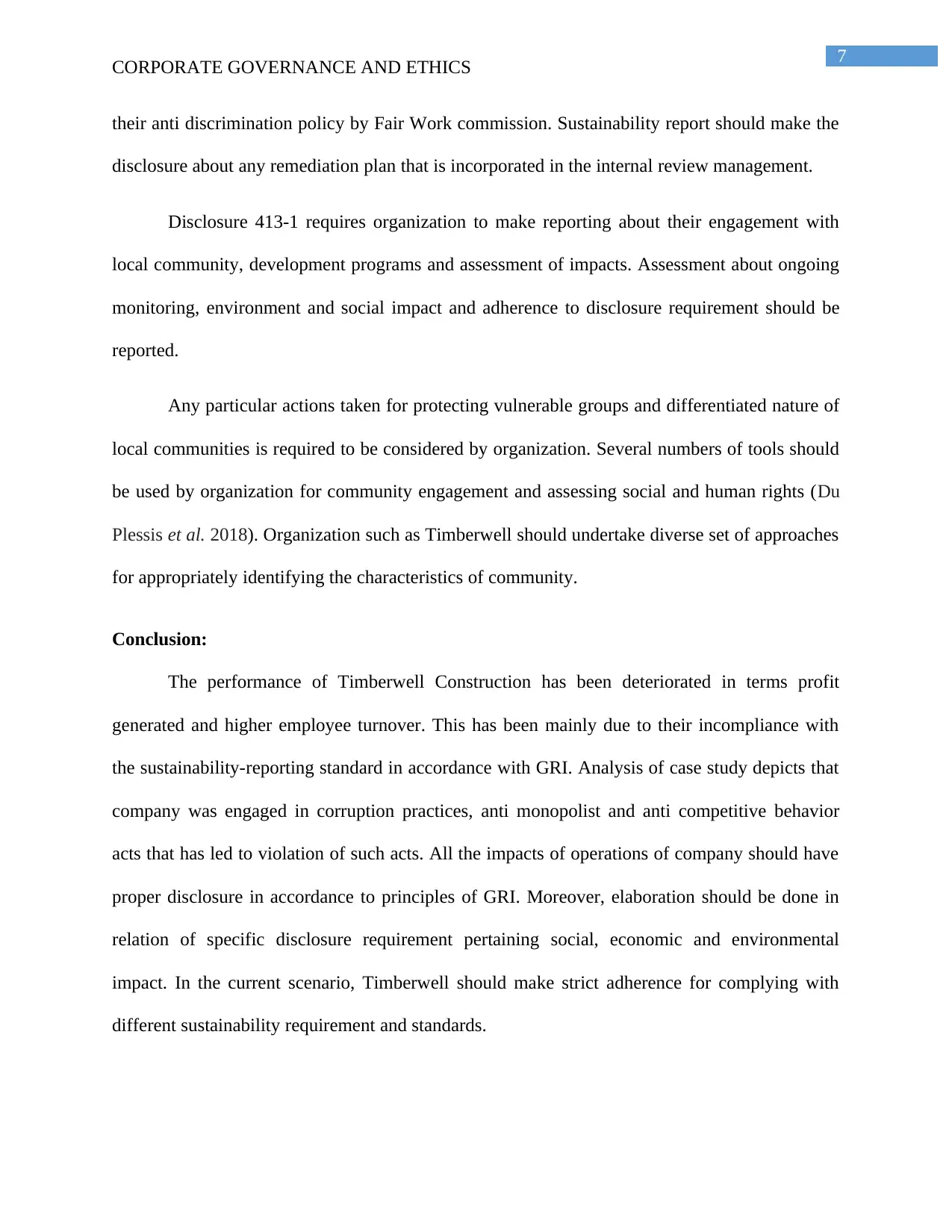
7
CORPORATE GOVERNANCE AND ETHICS
their anti discrimination policy by Fair Work commission. Sustainability report should make the
disclosure about any remediation plan that is incorporated in the internal review management.
Disclosure 413-1 requires organization to make reporting about their engagement with
local community, development programs and assessment of impacts. Assessment about ongoing
monitoring, environment and social impact and adherence to disclosure requirement should be
reported.
Any particular actions taken for protecting vulnerable groups and differentiated nature of
local communities is required to be considered by organization. Several numbers of tools should
be used by organization for community engagement and assessing social and human rights (Du
Plessis et al. 2018). Organization such as Timberwell should undertake diverse set of approaches
for appropriately identifying the characteristics of community.
Conclusion:
The performance of Timberwell Construction has been deteriorated in terms profit
generated and higher employee turnover. This has been mainly due to their incompliance with
the sustainability-reporting standard in accordance with GRI. Analysis of case study depicts that
company was engaged in corruption practices, anti monopolist and anti competitive behavior
acts that has led to violation of such acts. All the impacts of operations of company should have
proper disclosure in accordance to principles of GRI. Moreover, elaboration should be done in
relation of specific disclosure requirement pertaining social, economic and environmental
impact. In the current scenario, Timberwell should make strict adherence for complying with
different sustainability requirement and standards.
CORPORATE GOVERNANCE AND ETHICS
their anti discrimination policy by Fair Work commission. Sustainability report should make the
disclosure about any remediation plan that is incorporated in the internal review management.
Disclosure 413-1 requires organization to make reporting about their engagement with
local community, development programs and assessment of impacts. Assessment about ongoing
monitoring, environment and social impact and adherence to disclosure requirement should be
reported.
Any particular actions taken for protecting vulnerable groups and differentiated nature of
local communities is required to be considered by organization. Several numbers of tools should
be used by organization for community engagement and assessing social and human rights (Du
Plessis et al. 2018). Organization such as Timberwell should undertake diverse set of approaches
for appropriately identifying the characteristics of community.
Conclusion:
The performance of Timberwell Construction has been deteriorated in terms profit
generated and higher employee turnover. This has been mainly due to their incompliance with
the sustainability-reporting standard in accordance with GRI. Analysis of case study depicts that
company was engaged in corruption practices, anti monopolist and anti competitive behavior
acts that has led to violation of such acts. All the impacts of operations of company should have
proper disclosure in accordance to principles of GRI. Moreover, elaboration should be done in
relation of specific disclosure requirement pertaining social, economic and environmental
impact. In the current scenario, Timberwell should make strict adherence for complying with
different sustainability requirement and standards.
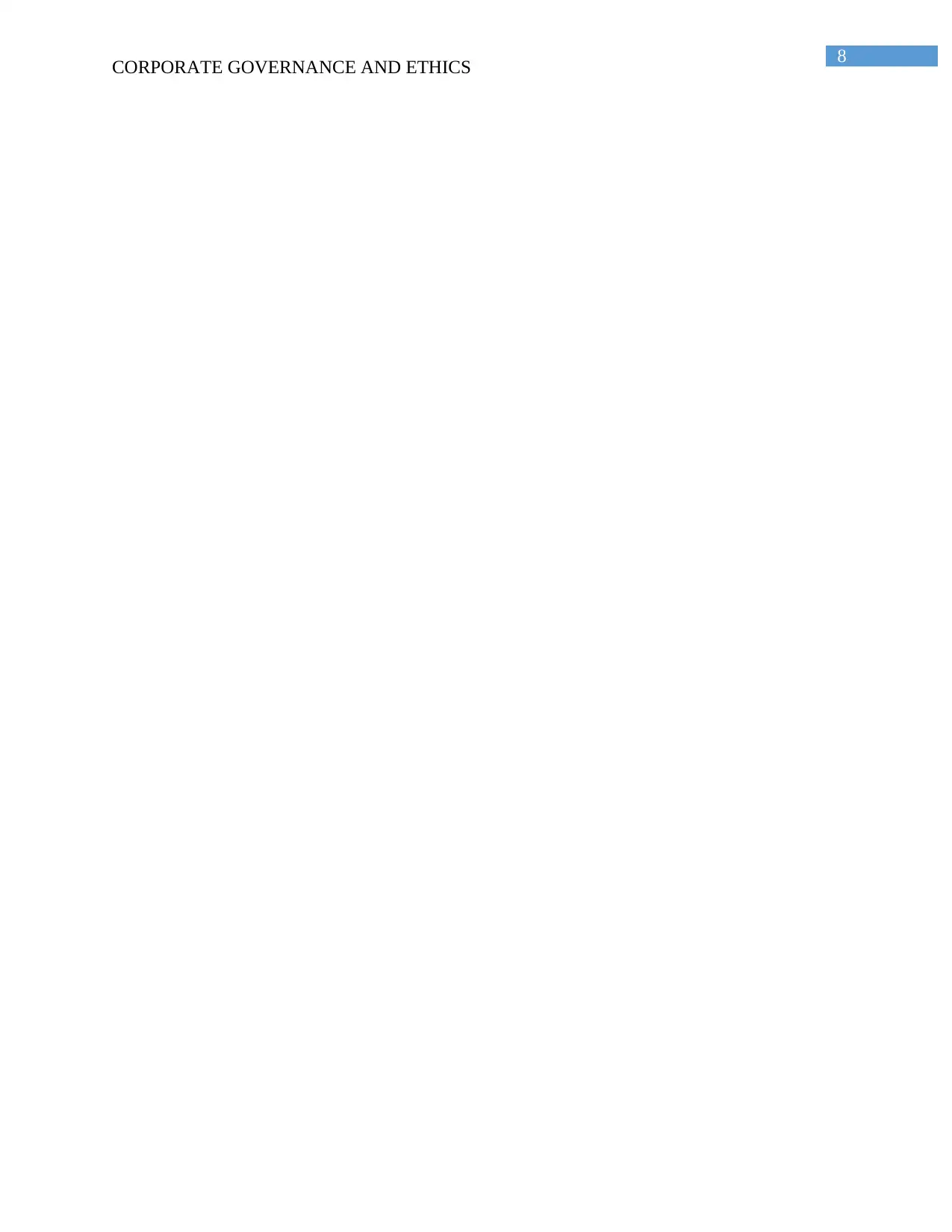
8
CORPORATE GOVERNANCE AND ETHICS
CORPORATE GOVERNANCE AND ETHICS
⊘ This is a preview!⊘
Do you want full access?
Subscribe today to unlock all pages.

Trusted by 1+ million students worldwide
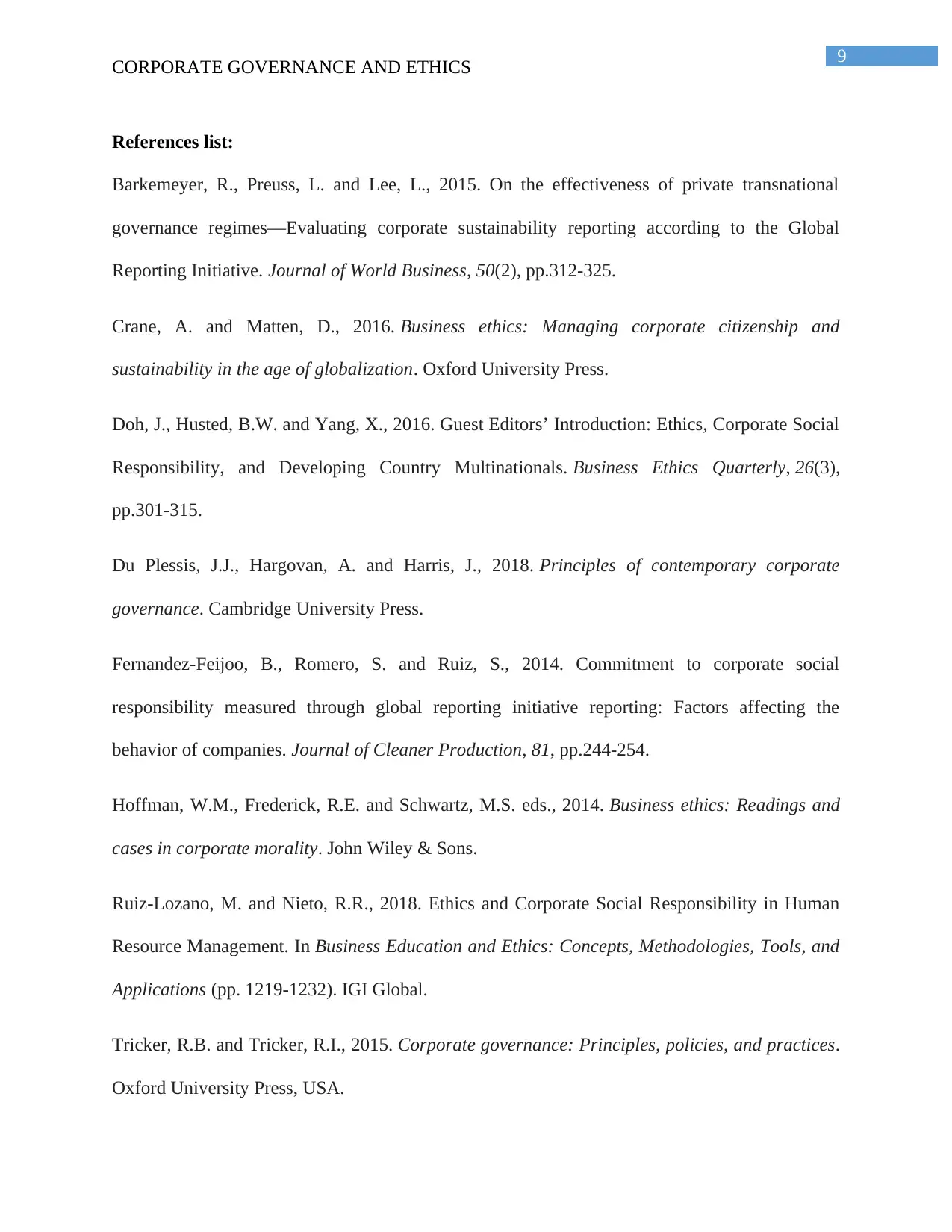
9
CORPORATE GOVERNANCE AND ETHICS
References list:
Barkemeyer, R., Preuss, L. and Lee, L., 2015. On the effectiveness of private transnational
governance regimes—Evaluating corporate sustainability reporting according to the Global
Reporting Initiative. Journal of World Business, 50(2), pp.312-325.
Crane, A. and Matten, D., 2016. Business ethics: Managing corporate citizenship and
sustainability in the age of globalization. Oxford University Press.
Doh, J., Husted, B.W. and Yang, X., 2016. Guest Editors’ Introduction: Ethics, Corporate Social
Responsibility, and Developing Country Multinationals. Business Ethics Quarterly, 26(3),
pp.301-315.
Du Plessis, J.J., Hargovan, A. and Harris, J., 2018. Principles of contemporary corporate
governance. Cambridge University Press.
Fernandez-Feijoo, B., Romero, S. and Ruiz, S., 2014. Commitment to corporate social
responsibility measured through global reporting initiative reporting: Factors affecting the
behavior of companies. Journal of Cleaner Production, 81, pp.244-254.
Hoffman, W.M., Frederick, R.E. and Schwartz, M.S. eds., 2014. Business ethics: Readings and
cases in corporate morality. John Wiley & Sons.
Ruiz-Lozano, M. and Nieto, R.R., 2018. Ethics and Corporate Social Responsibility in Human
Resource Management. In Business Education and Ethics: Concepts, Methodologies, Tools, and
Applications (pp. 1219-1232). IGI Global.
Tricker, R.B. and Tricker, R.I., 2015. Corporate governance: Principles, policies, and practices.
Oxford University Press, USA.
CORPORATE GOVERNANCE AND ETHICS
References list:
Barkemeyer, R., Preuss, L. and Lee, L., 2015. On the effectiveness of private transnational
governance regimes—Evaluating corporate sustainability reporting according to the Global
Reporting Initiative. Journal of World Business, 50(2), pp.312-325.
Crane, A. and Matten, D., 2016. Business ethics: Managing corporate citizenship and
sustainability in the age of globalization. Oxford University Press.
Doh, J., Husted, B.W. and Yang, X., 2016. Guest Editors’ Introduction: Ethics, Corporate Social
Responsibility, and Developing Country Multinationals. Business Ethics Quarterly, 26(3),
pp.301-315.
Du Plessis, J.J., Hargovan, A. and Harris, J., 2018. Principles of contemporary corporate
governance. Cambridge University Press.
Fernandez-Feijoo, B., Romero, S. and Ruiz, S., 2014. Commitment to corporate social
responsibility measured through global reporting initiative reporting: Factors affecting the
behavior of companies. Journal of Cleaner Production, 81, pp.244-254.
Hoffman, W.M., Frederick, R.E. and Schwartz, M.S. eds., 2014. Business ethics: Readings and
cases in corporate morality. John Wiley & Sons.
Ruiz-Lozano, M. and Nieto, R.R., 2018. Ethics and Corporate Social Responsibility in Human
Resource Management. In Business Education and Ethics: Concepts, Methodologies, Tools, and
Applications (pp. 1219-1232). IGI Global.
Tricker, R.B. and Tricker, R.I., 2015. Corporate governance: Principles, policies, and practices.
Oxford University Press, USA.
Paraphrase This Document
Need a fresh take? Get an instant paraphrase of this document with our AI Paraphraser
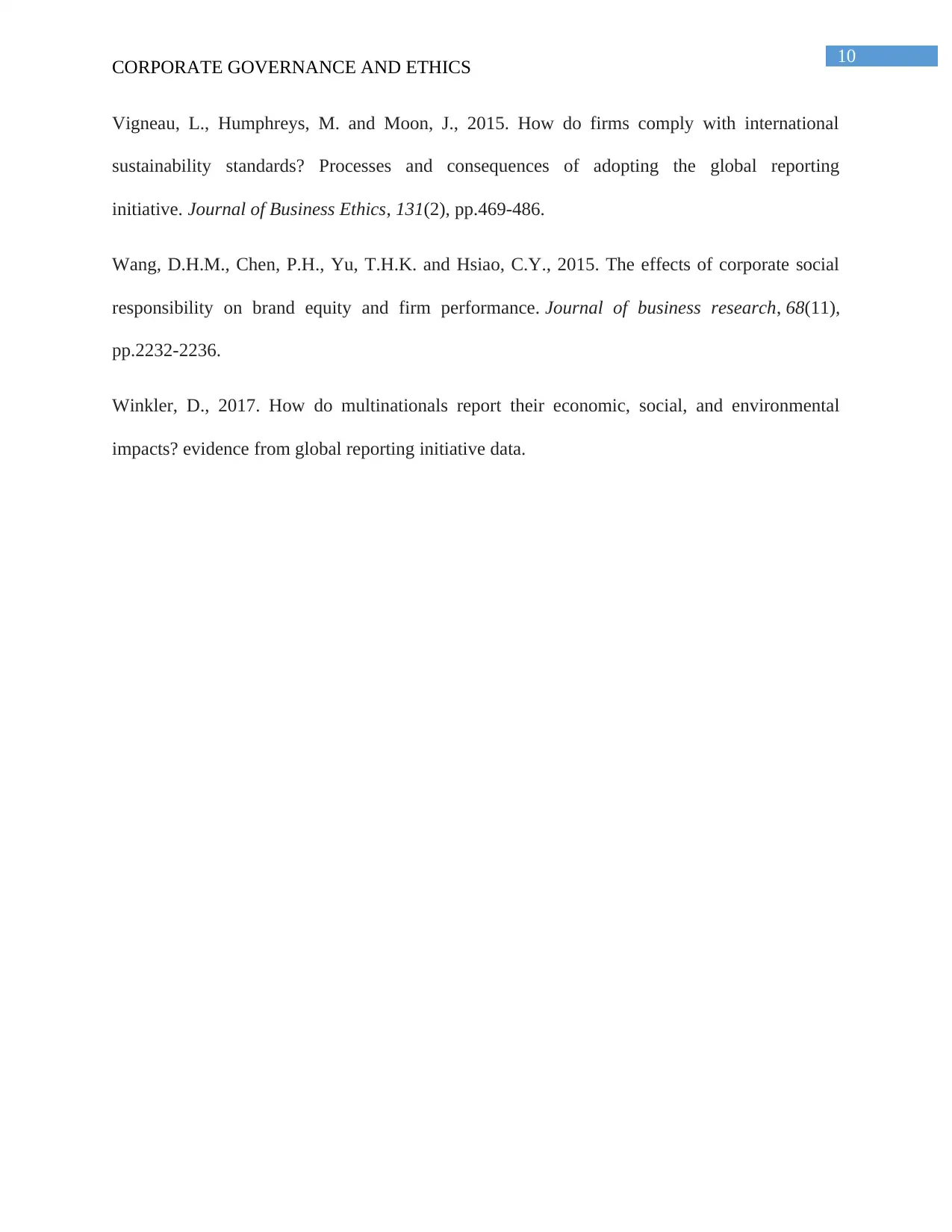
10
CORPORATE GOVERNANCE AND ETHICS
Vigneau, L., Humphreys, M. and Moon, J., 2015. How do firms comply with international
sustainability standards? Processes and consequences of adopting the global reporting
initiative. Journal of Business Ethics, 131(2), pp.469-486.
Wang, D.H.M., Chen, P.H., Yu, T.H.K. and Hsiao, C.Y., 2015. The effects of corporate social
responsibility on brand equity and firm performance. Journal of business research, 68(11),
pp.2232-2236.
Winkler, D., 2017. How do multinationals report their economic, social, and environmental
impacts? evidence from global reporting initiative data.
CORPORATE GOVERNANCE AND ETHICS
Vigneau, L., Humphreys, M. and Moon, J., 2015. How do firms comply with international
sustainability standards? Processes and consequences of adopting the global reporting
initiative. Journal of Business Ethics, 131(2), pp.469-486.
Wang, D.H.M., Chen, P.H., Yu, T.H.K. and Hsiao, C.Y., 2015. The effects of corporate social
responsibility on brand equity and firm performance. Journal of business research, 68(11),
pp.2232-2236.
Winkler, D., 2017. How do multinationals report their economic, social, and environmental
impacts? evidence from global reporting initiative data.
1 out of 11
Related Documents
Your All-in-One AI-Powered Toolkit for Academic Success.
+13062052269
info@desklib.com
Available 24*7 on WhatsApp / Email
![[object Object]](/_next/static/media/star-bottom.7253800d.svg)
Unlock your academic potential
Copyright © 2020–2026 A2Z Services. All Rights Reserved. Developed and managed by ZUCOL.




